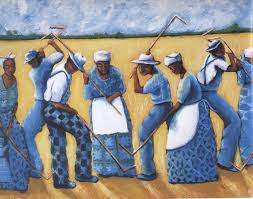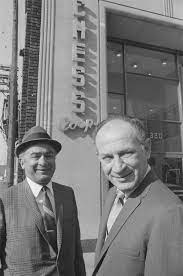Commodification of African American Music
By Kaia Bruce

Where it All Started
African American music began during times of slavery. It became an outlet for slaves in the south, to dance and sing and feel connected within their community. Since then, different genres have been produced that connect different cultures and allow people to come together and express themselves through creativity. Likewise, it has been a way for black artists to gain profit off of their passion. Throughout this post, I will explore many of the different genres produced in African American music, the ways black people were able to get paid for their music, and make note of some important elements and influencers throughout the evolution of music.

Negro Spirituals of the Eighteenth Century
In the 1700s-1800s, music began to flourish on plantations. The genre of Negro spirituals began and was a way for slaves to escape from reality and express themselves. The 100 slave songs is a book made by white people in the United States and captures a collection of spirituals that were sung by slaves. Furthermore, during the 1800s, Jubilee quartets began to form. They would sing and gain recognition on radios, movies, and minstrel shows and gain profit because white people wanted to use their music.
Ragtime
Ragtime occurred from the late 1800s until the 1920s. During this time, sheet money was a source of income for ragtime artists such as Scott Joplin. Joplin would sell his sheet music to white people, but did not make much.
Jazz and Blues
In the 1940s and 1950s, jazz and blues flourished. Jazz was upbeat and was a production of many cultures. Blues was music in response to slavery and expresses feelings of melancholy and sorrow. White people weren’t fond of blues and jazz, so it wasn’t easy to make money off of this music. Often through performance, artists were able to continue to gain recognition and whites would copy their style to try to make this music their own.
Record Row in the 1950s

Record row was rhythm and blues Chicago style; it was blues, rock and roll, and Windy City soul. It was owned by white people, but it set the standard of what black people should do in the record business. It contained record distributors such as, Chess records, One-derful, Chance, King, Constellation, Brunswick, and Vee-Jay records. Each record label signed black artist and were known for plenty of different artists. For example, Chess records signed Muddy Waters, Willy Dixon, and Chuck Berry and was known for the blues. Vee-Jay records signed Curtis Mayfield and Gerry Butler and was known for the genres duwop, blues, and gospel.
Summer of Soul
Summer of Soul refers to the Harlem Cultural Festival of 1969. Over 300,000 people attended the musical event, and the footage of it was hidden in the basement for 50 years; Summer of Soul explores this footage. Just after the death of Martin Luther King Jr., Tony Lawrence hosted the Harlem Cultural Festival which some believe was to prevent black people from burning the city down. Harlem was a place rich of culture, a place to feel safe, and a place to feel happy. Black people from all over came and crowded around the stage where different artists such as, B.B. King, Gladys Knight and the Pips, and Stevie Wonder came and performed some of their music. The festival was six weeks long and was filled with different genres of music that would provide a source of connect for those in the crowd.
Music in the Twenty-First Century
Hip Hop began in the 1970s and came after Disco. It is now one of the most popular genres of music and is still in evolution after 40 years. Hip Hop was created by DJs and became a party movement. After awhile, rappers began to rap about personal and societal issues that many of the black community could relate to. In the early 2000s, streaming apps and sites such as, apple music, Spotify, and spirilla were created and music was able to be streamed on mobile devices. Artists were able to gain recognition faster and easier and have been able to profit based off of their streams.

